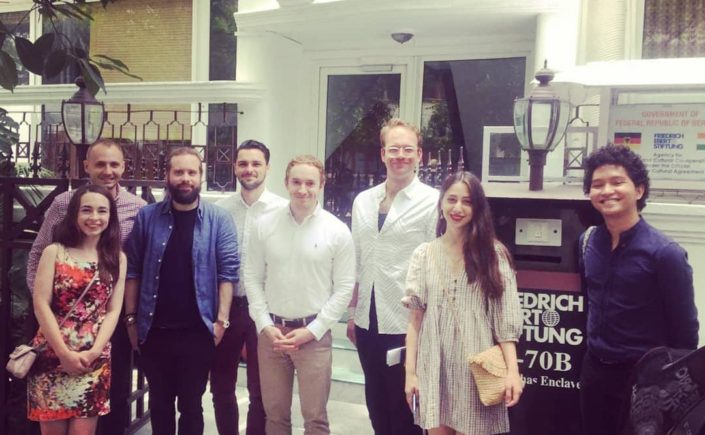In July, delegations of the International Union of Socialist Youth (IUSY) and the International Federation of Liberal Youth (IFLRY) visited India on a joint field visit. The aim of the mission was to get a better grasp of the political climate and the state of civil society in India after the 2019 General Elections—and the landslide victory of the governing party, Bharatiya Janata Party (BJP), and Prime Minister Narendra Modi. The delegation visited several democratic parties, political foundations, NGOs, and civil society actors throughout the duration of the mission.
The delegation made the following observations:
- India maintains its vivid democratic culture and still shows an incredible diversity in civil society actors, ranging from research-based advocacy to hands-on political action. This is why we would like to express our deep concern that the increasing pressure of the current government on civil society could jeopardize this vivid political culture. The indicators for our concerns are rooted the in the increasing difficulties in registration procedures for NGOs, the vague policing of violations to the “interests of the Indian state”, the centralization of social service programs to government-friendly agencies, and the structured harassment and intimidation of media organizations reporting critically about the work of the prime minister and/or government
- Yet, due to the lack of education, the mission observed a general lack of political education across all sectors and classes of Indian society. This manifests in the practical absence of the classical ideological divisions (socialism, liberalism, etc.) amongst the mainstream democratic parties.
- Moreover, the delegations noted the following:
- The rise of so-called “Hindu Nationalism”—which actively undermines democratic pluralism and viewpoint diversity. We see this as the biggest threat to the promotion of minority rights and social stability in India.
- The worrisome rise of fake news, public outrage, and mob culture as an electoral tool. These tools do not only threaten the secular foundations of India’s democracy; but also contribute to political and religious polarization —and therefore to the dangerous social environment that all minorities (especially women and LGBTIQ) in India are facing.
- Increasing bureaucratization of processes (e.g. registration, accessing foreign funds, etc.) in civil society might hinder the preservation of viewpoint diversity in India’s democratic and social discourse.
This field visit has been part of the Global Youth Programme—a global cross-party initiative based on the cooperation between the two political families represented by IUSY and IFLRY—funded by the Swedish International Development Agency (SIDA) and with the support of the Olof Palme International Center (OPC) and the Center Party International Foundation (CIS).
Members of the Delegation
Ana Pirtskhalava (IUSY), Secretary General
Justine Balane (IUSY), Vice President & Asia Coordination
Roland Gur (IUSY), Control Commission
Sven Gerst (IFLRY), Secretary General
Olha Tsurkan (IFLRY), Treasurer & Asia Coordination
Daan Looij (IFLRY), Financial Coordinator

